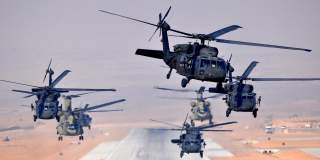America Can't Terror-Proof Afghanistan
More U.S. troops in Afghanistan may result in more direct combat with the Taliban.
Afghanistan cannot be terror-proofed by the United States without the neighbors or the neighbors without the United States. The neighbors might welcome U.S. participation in a regional stabilization or peace process, as long as it leads to the eventual departure of U.S. troops rather than their entrenchment in the region. Such a settlement will have to include a negotiated agreement with at least some of the Afghan Taliban, which all regional actors now support. The United States could signal its interest in such a regional approach by joining the Asia Infrastructure Investment Bank founded by China to finance regional development and actively promoting private sector involvement in regional connectivity. That would show the U.S. presence serves not only its immediate goal of counterterrorism, but also supports regional economic cooperation in the interest of the neighbors. It should not be beyond the ability of the United States to cooperate with Russia or even Iran where interests coincide, despite conflict elsewhere, as the United States does with China and did in Afghanistan with the Soviet Union before 1978. Whether to deny safe haven to terrorists, facilitate region-wide investment and connectivity, or enable Afghans to “die in their beds,” as one defined their national aspiration, there is only one path: pursuit of a diplomatic settlement supported by all major powers in the neighborhood, leading to a negotiated, gradual end to the U.S. military presence.
Barnett R. Rubin is director of the Afghanistan Regional Project at the Center on International Cooperation of New York University. He has served as senior advisor to both the U.S. special representative for Afghanistan and Pakistan and the UN special representative of the secretary-general for Afghanistan. His most recent book is Afghanistan from the Cold War through the War on Terror.
Image: Aerial mission at Multinational Base Tarin Kowt, Afghanistan. Flickr/DVIDSHUB

